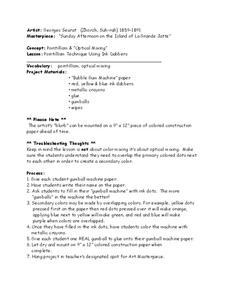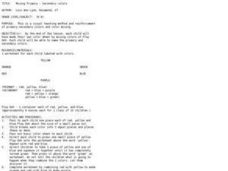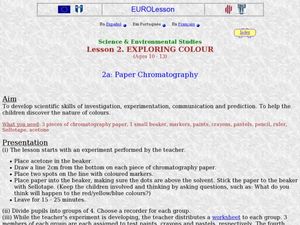Curated OER
Primary & Secondary Colors
Students identify primary and secondary colors and how they relate to each other, and experiment with mixing colors.
North Birmingham Academy
Color Theory
What better way to learn about colors than by coloring? Starting with the primary colors, young artists follow written prompts to shade in various rectangles and a color wheel to show complementary colors, tints and shades, and more.
Curated OER
I Can Mix Colors!
In this early childhood mixing colors worksheet, learners trace the words red, blue, and yellow. They also color blanks palettes with the appropriate colors as they identify primary colors a mix them to create green, orange, and purple.
Curated OER
Do You Know Your Colors?
Red, yellow, green, and blue are such wonderful colors. Introduce your littlest learners to the color names, where they are commonly found, and how they can be mixed or made. A highly visual presentation that shows its colors.
Curated OER
Primary and Secondary Colors
Students explore primary and secondary colors. In this art lesson, students use jars of colored water to create the secondary colors.
Curated OER
Mixing Complimentary Colors, Tints, and Shades
Students explore primary, secondary, and complimentary colors. They mix tempera paints to create secondary colors, tints, and shades, and design and paint a color grid demonstrating color theory.
Curated OER
Colors
Students explore various colors. They research information on the primary and secondary colors. Students research the colors of the rainbow and they create a picture of a rainbow using Kid Pix.
Art Institute of Chicago
Color Combinations
Explore color through an examination of pointillism and light. Class members view Georges Seraut's famous painting on a computer, zooming in and out to see the details and effects of the technique. They then cover how light and color are...
Curated OER
Color Mix Up
In this art activity, students use the template of shapes and paint the colors as directed with water colors. Students allow the paints to dry before applying the second overlapping color. This activity is geared to the adults who will...
Curated OER
Pointillism Technique Using Ink Dabbers
A gumball machine art project is a great way to learn about optical mixing in a study of pointillism and Georges Seurat. Kids create their own masterpieces and learn about primary and secondary colors in the process.
Curated OER
Color Questions
In this colors worksheet, students read through a chart that explains which primary colors can be mixed together to form secondary colors. They then answer 3 questions about mixing colors. Finally, students answer 4 additional questions...
Oglebay Institute
Post-Impressionism: Pointillism
How can little dots in two colors make a third color? Experiment with pointillism and color mixing with a series of activities. After viewing paintings by Seurat and watching a teacher demonstration, pupils create samples of three...
Curated OER
Flipping Butterflies: Triadic Colors and Symmetry
Second graders create symmetrical butterfly wings. In this symmetry instructional activity, 2nd graders observe butterfly wings and create their own. They make both sides symmetrical and mix primary colors to make secondary colors.
Curated OER
Mixing Primary Colors
Students demonstrate ways to mix primary colors. In this visual arts lesson, students use gelatin and food coloring to create various color mixtures. Students also use tempra paint to mix colors together.
Curated OER
Edible Color Wheels
Students create an edible color wheel using cookies and frosting. They mix tints into frosting to simulate the color of the color wheel.
Curated OER
Tasty Color Mixing
Students discover the "magic" of color mixing in this fun, elementary lesson using vanilla cake frosting, food coloring, mixing bowls, popsicle sticks, and plain vanilla cookies (optional). Emphasis is placed on the difference betweeen...
Curated OER
Color Mixing
Students, using the Colorcube 3D model, explore how to mix an entire color space with only the primary colors: cyan, magenta and yellow.
Curated OER
Color Theory
Sixth graders explore the basics of color mixing with paint by creating secondary and tertiary colors. Individually, 6th graders create their own paintings based on a popular series of sculptures.
Curated OER
Complementary Color Experiments
Students experiment with color mixing and differentiate between primary and secondary colors. They use their observational skills in visual experiments with complementary colors to gain an understanding of the interrelationships of art,...
Curated OER
Crepe or Tissue Paper Blots
What happens when you drip vinegar onto tissue paper? The colors bleed, leaving an interesting and organic design. Get your class observing and creating with this quick-and-easy art project. Tip: This can also be done using coffee...
Curated OER
Mixing Colors
First graders, exploring and experimenting with the primary colors of red, yellow and blue, mix different colored icings together to create other colors formed with primary colors. The color wheel is also discussed and shown during this...
Curated OER
Mixing Primary and Secondary Colors
Students create their own color wheel by mixing colors of Playdoh. Each child names the primary and secondary colors.
Curated OER
Exploring Color: Paper Chromatography
Students experiment with colors. In this art lesson, students investigate the combinations that can be made with primary colors using chromatography paper and markers. Students complete a color mixing worksheet in groups.
Curated OER
How Are Colors Created?
Kids explore primary and secondary colors, as well as the concepts of tints and shade in a series of color lessons. The packet includes detailed directions for how to use BrainPOP Jr. resources to create learning stations where kids...

























